人教版英语必修3Unit 1 Festivals around the world复习课件(53张ppt)
文档属性
| 名称 | 人教版英语必修3Unit 1 Festivals around the world复习课件(53张ppt) |  | |
| 格式 | zip | ||
| 文件大小 | 4.5MB | ||
| 资源类型 | 教案 | ||
| 版本资源 | 人教版(新课程标准) | ||
| 科目 | 英语 | ||
| 更新时间 | 2020-03-25 09:18:02 | ||
图片预览





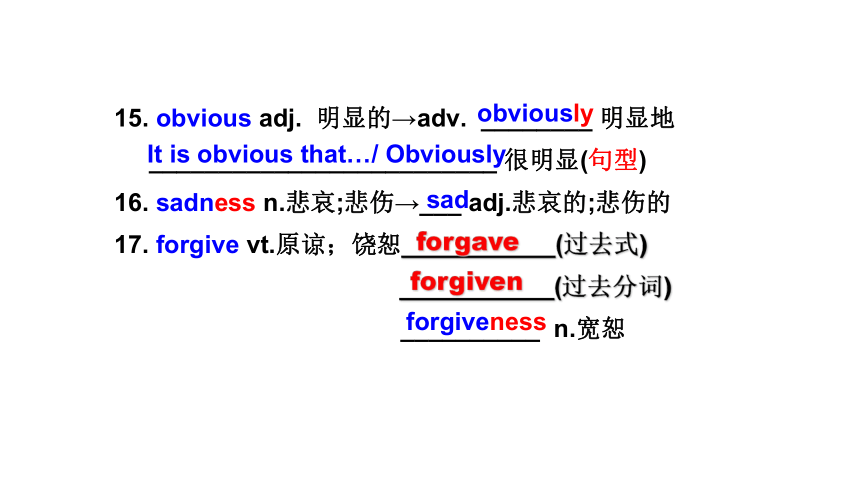
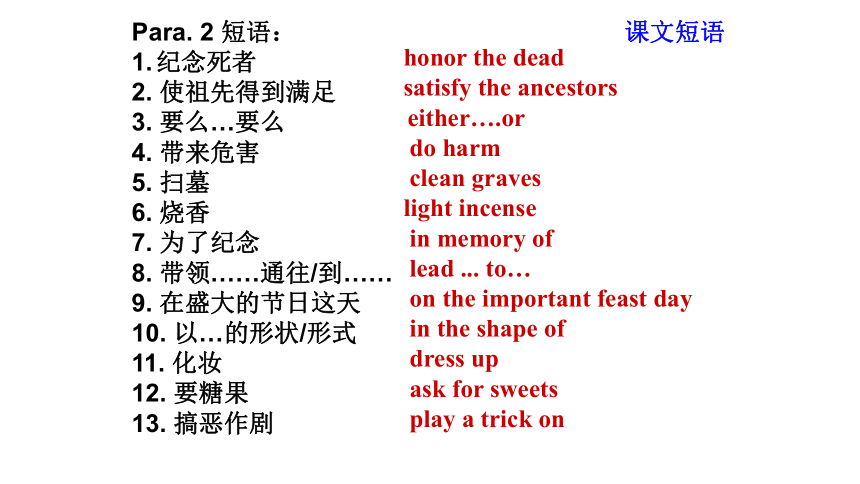
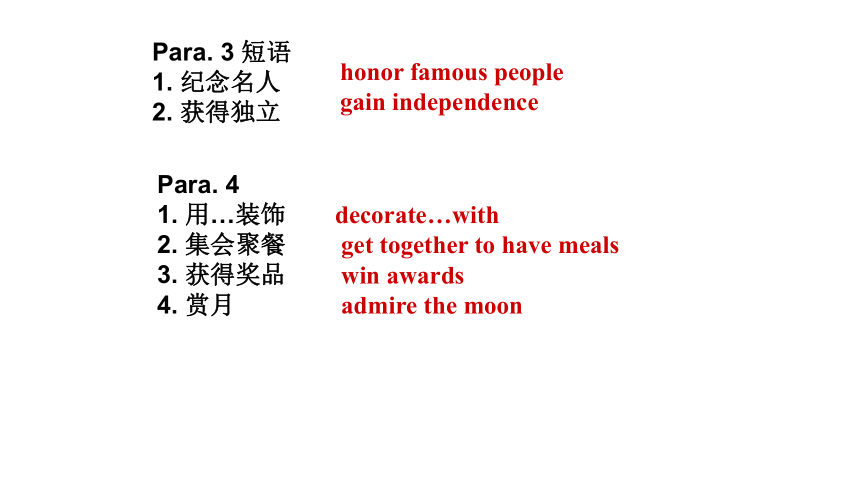
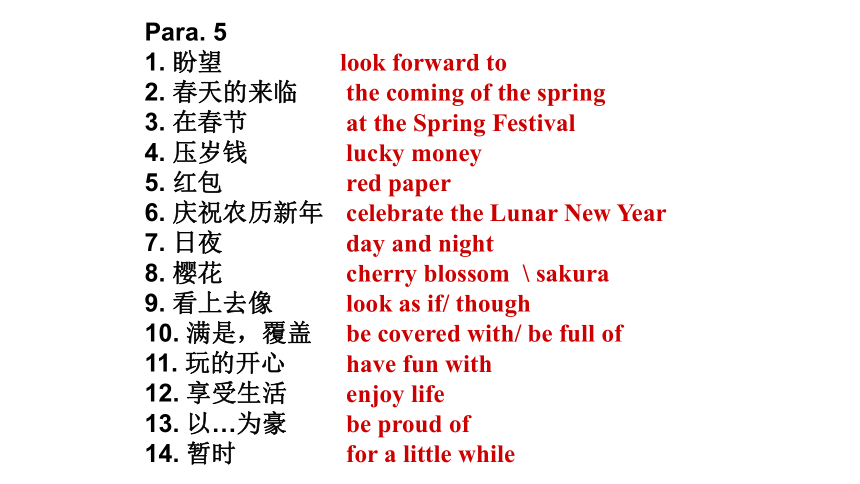
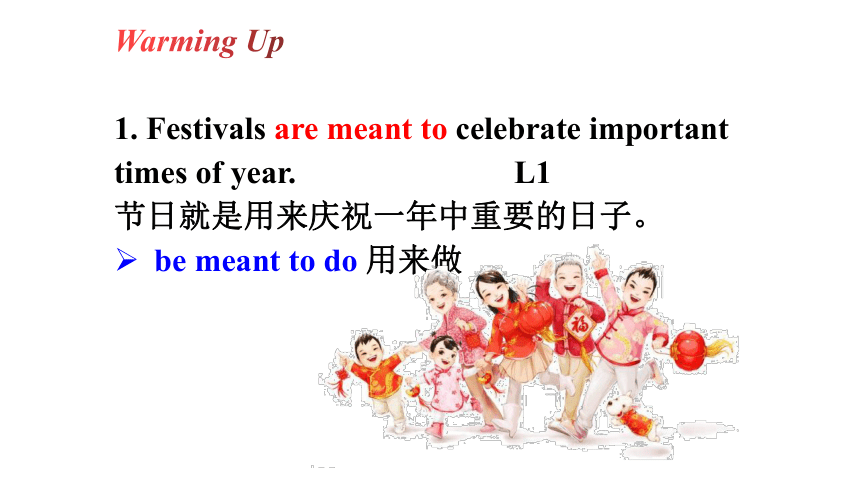

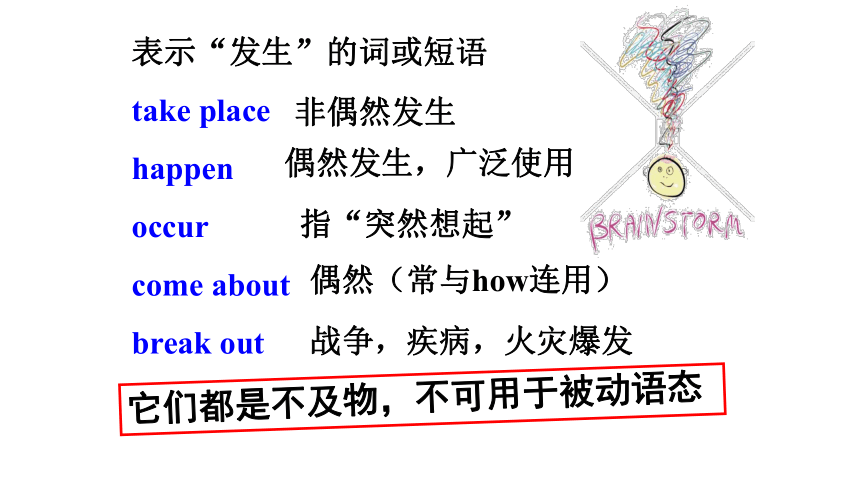
文档简介
(共53张PPT)
Unit 1 Festivals around the world
Revision
1. beauty n.美; 美人→ _________adj.美丽的→
________ vt. 美化
2. celebration n.庆祝;祝贺→________ vt. 庆祝;祝贺
3. hunter n.猎人→_____ vt. 打猎 ________寻找(短语)
4. starve vi. & vt.(使)饿死→ _________ n.饿死
5. origin n.起源;由来;起因→_______adj.原来的
6. religion n.宗教→ ________
adj.宗教上的; 信奉宗教的; 虔诚的
beautiful
词汇拓展
beautify
celebrate
starvation
original
religious
hunt
hunt for
7. belief n.信任;信心;信仰→ ________ vt. 相信;信任
____________ adj.可以相信的______________(adj)难以相信的_________ 信任;相信…的存在(短语)
8. trick. n. 诡计; 恶作剧 ______________(短语)开玩笑 =____________________=_____________
9. arrival n. 到达; 到达者→ vi. ______ 到达 ________________/ __________ 某人一到达(短语)
10. independence n.独立; 自主→ ___________ adj.独立的 _______________________ 获得独立(短语)
believe
believe in
unbelievable
believable
play a trick on
play a joke/jokes on
make fun of
arrive
on one’s arrival
on arriving
independent
gain one's independence
-ence n
-ent adj
10. agricultural adj.农业的;农艺的→
__________ n.农业;农艺;
11. admire vt.赞美;钦佩;羡慕→
_________ n. 羡慕 __________ n.崇拜者,羡慕者
12. energetic adj.充满活力的;精力充沛的→
n. _______ 能量;精力
13. permission n.许可;允许→_______ vt.允许n.许可
证;执照__________________ 在…的允许之下(短语)
14. apologize vi.道歉;辩白→ _______ n.道歉
____________________________/
______________________ 因为…向…道歉(短语)
agriculture
admiration
energy
admirer
with one's permission
permit
apology
make an apology to sb. for sth.
apologize to sb. for sth
15. obvious adj. 明显的→adv. ________ 明显地
_________________________ 很明显(句型)
16. sadness n.悲哀;悲伤→___ adj.悲哀的;悲伤的
17. forgive vt.原谅;饶恕___________(过去式)
___________(过去分词)
__________ n.宽恕
sad
forgiveness
obviously
It is obvious that…/ Obviously
forgave
forgiven
Para. 2 短语:
纪念死者
2. 使祖先得到满足
3. 要么…要么
4. 带来危害
5. 扫墓
6. 烧香
7. 为了纪念
8. 带领……通往/到……
9. 在盛大的节日这天
10. 以…的形状/形式
11. 化妆
12. 要糖果
13. 搞恶作剧
honor the dead
satisfy the ancestors
either….or
do harm
clean graves
light incense
in memory of
lead ... to…
on the important feast day
in the shape of
dress up
ask for sweets
play a trick on
课文短语
Para. 3 短语
1. 纪念名人
2. 获得独立
honor famous people
gain independence
Para. 4
1. 用…装饰
2. 集会聚餐
3. 获得奖品
4. 赏月
decorate…with
get together to have meals
win awards
admire the moon
Para. 5
1. 盼望
2. 春天的来临
3. 在春节
4. 压岁钱
5. 红包
6. 庆祝农历新年
7. 日夜
8. 樱花
9. 看上去像
10. 满是,覆盖
11. 玩的开心
12. 享受生活
13. 以…为豪
14. 暂时
look forward to
the coming of the spring
at the Spring Festival
lucky money
red paper
celebrate the Lunar New Year
day and night
cherry blossom \ sakura
look as if/ though
be covered with/ be full of
have fun with
enjoy life
be proud of
for a little while
Warming Up
1. Festivals are meant to celebrate important times of year. L1
节日就是用来庆祝一年中重要的日子。
be meant to do 用来做
mean的用法
1). Playing all the time means failing the exam.
v. mean doing sth.意味着…
2). Sorry, I didn't mean to hurt you.
v. mean to do sth. =plan to do sth.打算做某事
3). I had meant to do English exercise first, but my teammates asked me to play dota.
v. had meant to do sth. 本打算做某事
4). He is such a mean person that he never allows his wife to buy new clothes.
mean adj.吝啬的,卑鄙的
5). A car is a means of transport.
means n.(单复同形)方法,手段工具
表示“发生”的词或短语
take place
happen
occur
come about
break out
它们都是不及物,不可用于被动语态
非偶然发生
偶然发生,广泛使用
指“突然想起”
偶然(常与how连用)
战争,疾病,火灾爆发
3. At that time people would starve if food was difficult to find. P1 L5
如果食物难找到, 他们会饿死。
starve vt.&vi. (使)饿死;使挨饿
starve for 渴望得到…
be starved of 极需,缺乏
starve to death 饿死
starvation n.挨饿,饿死
Reading
food was difficult to find
---to do 与主语 动宾关系
---类似形容词有:easy, hard, difficult interesting, pleasant, nice, fit, unfit, bitter, light, heavy ,dangerous, important, sweet, necessary.
--动词不定式: 及物动词 \不及物动词 +介词
---改写; To do ...+be+形容词
It be +形容词 +to do...
eg 1. The man is difficult to get along with.
eg 2. The house is comfortable to live in.
eg 3. The text is easy to understand.
“主语+be +形容词+动词不定式”
#. Some festivals are held to honour the dead or to satisfy the ancestors. P2 L10
honour (honor)
1. 尊敬,给以荣誉(v)
2. 光荣,荣誉,光荣的人或事情 (n)
(1). Children should honour their parents.
(2). They fight for the honour of the country.
(3). Liu Xiang is an honour to our country.
in honour of 为了纪念(表语、状语)
The monument is built in honour of the hero.
honorable adj.值得尊敬的
honored adj. 受尊敬的
satisfy
vt. 使满意
satisfaction n. 满意、令人满意的人/物
satisfied adj. (人感到)满意的
satisfying/ satisfactory adj. (物)令人满意的
satisfy sb./sth. 使某人/某物满意
be satisfied with... 对...满意
to one’s satisfaction 令某人满意的是
#. For the Japanese festival Obon, people should go to clean graves and light incense in memory of their ancestors. P2 L11
memory n. 记忆
memorize v. 记忆
in memory of 纪念 ......(作表语、状语)
e.g. The museum was built in memory of the
famous scientist.
这个博物馆是为了纪念那位著名的科学家而建立的。
Translation:
他写了首感人的诗来纪念他的妻子。
__________________.
in memory of his wife
memorize a poem记一首诗
He wrote a moving poem
类似短语有:
in favor of
in charge of
in need of
in search of
in praise of
in honour of 为了纪念
赞成
主管,负责
需要
寻找
歌颂
#. They also light lamps and play music because they think that will lead the ancestors back to earth.
P2 L12
lead , led, led 领导,引导
lead ... to /lead to 领往; 通往; 导致
lead a ... life 过着…的生活
Translation
1. Playing computer games all the time will easily
lead to disease.
2. The little dog can lead you to Xi Feng Middle
School.
3. All roads lead to Rome.
条条大路通罗马。
#. They can dress up and go to their neighbours' home to ask for sweets. P2 L18
dress up vi . 穿上盛装
dress up in + 衣物
dress up as + 角色
dress sb. in… 为某人穿上…衣服
---be dressed (in ...) (指状态)
---get dressed (指动作)
#. ...the children might play a trick on them. P2L20
play a trick on
=play tricks on 搞恶作剧,开玩笑
---- trick n. 诡计,恶作剧,窍门vt / vi 欺骗
the tricks of learning English
v. trick sb into (doing) sth.诱使某人(做)某事
v. trick sb out of sth 从某人处骗走某物
Translation
他骗我买他的产品。
He ______ me ____ _______ his products.
他骗走了我一百万。
He ______ me ____ ____ one million yuan.
tricked into buying
tricked out of
#. Some people might win awards for their produce. P4 L32
award
n. 奖品,奖项,奖金, 助学金 ……
win/receive/get an award for 因……而获奖
eg, Mary got an award for her project.
She won the best actress award.
vt. 授予……裁定……
award sb sth= award sth to sb 授予某人某物
be awarded for...因…而获奖
The judges awarded both teams equal points.
=The judges awarded equal points to both teams.
辨析:
award n./v 奖, 获奖
reward n./v 奖赏,给…报酬
award后接双宾语
award sb sth. 授予某人奖章
reward 奖赏, 给…报酬, 不能接双宾语;
reward sb. for sth. 因 …奖赏某人;
reward sb. with sth. 用某物酬劳某人
#. People admire the moon and enjoy moon-cakes. P4 L33
admire vt.钦佩,羡慕,赞美
admire sb./sth. for sth. 因某事钦佩某人/某事
eg. I admire him for his success in business.
admiration n.赞美,钦佩
admirable adj. 值得钦佩的
admiring adj.赞赏的,羡慕的
have admiration for sb./sth.钦佩某人/某物
#. The most energetic and important festivals are the ones that look forward to the end of winter and to the coming of spring. P5L36
look forward to + sth./doing sth. 盼望,期待
to为介词,其后接名词或动名词(动词ing形式)。
填空
(1)My mother said she was _______ _______
_____ _______you.我妈妈说她正期待着与你见面。
(2)Children are ___________________________
_______________.
孩子们盼望新年的到来。
looking forward
to meeting
looking forward to the coming
of new year
#.The country, _______(cover) with cherry tree flowers, looks as though it is covered with pink snow.
整个国度到处都是樱花盛开,看上去就像罩上了一层粉红的雪。 P5 L45
as though=as if 好像,似乎,
引导表语从句或方式状语从句
He behaved as if/ though nothing had happened.
He talks as if/though he knew everything.
He looks as if he were ill.
1. 多用虚拟语气,如果表示与现在事实相反,谓语用_________, be 动词用_____;若与过去事实相反,谓语则用_______________。
It looks as if/ though it is going to rain.
2. 陈述语气 (表示很可能发生的事实用陈述语气)
covered
一般过去时
were
过去完成时
#. People love to get together to eat, drink and have fun with each other. P6 L47
have fun (with) ...(与…)玩得开心
____________________做某事很快乐
____________________为了玩乐
____________________取笑某人
eg 改错;
We climbed the mountain and had a fun.
have fun (in) doing sth
for fun
make fun of
╲
情态动词表示说话者的情感,态度和语气。它们本身有一定的意义,但没有人称和数的变化(have to除外),不能单独作谓语,后加动词原形一起构成句子的谓语。
表示否定时在情态动词后加not(have to除外),
表示疑问时将情态动词提至主语前即可(have to除外)。
语法: 情态动词
两大特点:
1.不受人称和数的影响(本身保持原形);
2.其后必须加动词原形,一同构成谓语。
一.can/could
1.He can speak English fluently.
2.---Could I use your phone?
---Yes , of course you can.
3.It can’t be my father. He is now abroad.
B.能力 “能”
A.请求/许可 “可以”
D.猜测/可能性 “不可能”
Permission/Request B. Ability C. Wish
D. Possibility/Guessing E. Duty/Rule(规定,命令)
注意:
1.can表“(主观的)猜测/可能性”时,用于否定句或疑问句。
2.在肯定句中,can可表客观的/理论的/偶尔的可能性。
e.g. Accidents can happen on such rainy days.
二.may/might
1.May I ask you a question?
2.John is absent. He may be ill.
3.May he rest in peace.
Permission/Request B. Ability C. Wish
D. Possibility/Guessing E. Duty/Rule
A.请求/许可 “可以”
D.猜测/可能性“可能”
C.祝愿 “愿,祝”
注意:
might一般表示过去可能,也可用现在,比may
语气更弱
e.g.----Is this Tom’s bike?
----I am not sure, but it might be.
三.must
1.You must hand in your homework before Friday.
2.You must be hungry now.
*3.Mike, look at the time. Must you play the piano at such a late hour?
A. Permission/Request B. Ability C. Wish
D. Possibility/Guessing E. Duty/Rule
E.命令 “必须”
D.猜测/可能性 “一定” 否定: can't
偏要(偏执的态度)
must
注意:
1.表“猜测/可能性”时,可能性从大到小:
must > can > could > may > might
2.mustn’t 只能表“不准,禁止”
e.g. Cell phones must not be brought to school.
3.must侧重主观看法,have to侧重客观需求。
e.g. We must rely on ourselves.
e.g. I have poor eyesight, so I have to wear glasses.
四.will/would
1.They won’t lend us any more money.
*2.Will you send this letter for me?
3.She will listen to music, alone in her room , for hours.
4.You will have your share( 份额).
5.Will you be quiet!
A. Permission/Request B. Willingness
C. Promise/Order D. Habit
B. 意愿“会”
A.(第二人称疑问句中)请求 would比will委婉客气
D.习惯,倾向
C.许诺
C.命令
五.should/shall
Permission/Request B. Duty
C. Advice D. Possibility
1.The children should be taken good care of.
2.You should have no problem with reading this book.
3.You should stop worrying about it.
*4.I find it astonishing that he should be so rude to you.
B.义务,职责“应当”
D. 可能性 “按道理应该”
C.建议“应当”
表说话人愤怒、惊讶、失望等特殊情绪“竟然”
5.He asked if he should get his book tomorrow.
(第一、三人称,常用于间接引语)征求意见
shall
1.主语是第一人称,表将来
e.g. This time next week I shall be in Scotland.
2.主语是第一、三人称,疑问句,征求意见/请求
e.g. What shall we do this weekend?
3.主语是第二、三人称,陈述句,表许诺、命令、警告、威胁等
e.g. You shall get an answer from me tomorrow.
明天你将会得到我的回答。(许诺)
4.主语是第三人称,陈述句,在条约/规定/法令等文件中表义务
e.g. Candidates(考生) shall remain in their seats until all the papers have been collected.
shall
六.need & dare
既可以做实义动词,也可以做情态动词。
1. I dare say…
2.How dare you say that to me?
3.
---Dare he go alone? ---No, he dare not.
---Does he dare to go alone? ---No , he doesn’t.
4.
---Need he do it now? ---No, he needn’t.
---Does he need to go there at once? ---Yes, he does.
(Yes, he must)
dare
doesn’t dare
dare 实义动词 dare to do
don't dare to do
情态动词 dare do
dare not do
Unit 1 Festivals around the world
单 元 检 测 题
一:单词拼写(每小题1分,共10分)
1. She’s s_________ herself to try to lose weight.
2. He particularly enjoyed playing t________ on the three men.
3. Young people want ______________(独立) from their parents.
4. The new president had to face n_______ and international issues.
5. On your ________(到达) at the hotel, please wait for further instruction.
6. Look! He is an _________(精力充沛的) child.
7. She was ________(授予) a medal for her bravery.
8. They celebrated the festival only to satisfy their ___________(祖先).
9. Our country paid much attention to the _____________(农业的) workers.
10. Christmas Day is a ________(宗教的) festival.
tarving
ricks
independence
ational
arrival
energetic
awarded
ancestors
agricultural
religious
二.请从下面方框中选择适当的单词或短语并用其正确形式填空。(每题1分,满分10分)
energy, religion, play tricks on, in memory of ,look forward to, day and night,
as though, dress up, took place, in the shape of
1. You don’t need to ________, just to go to the pub — jeans and a T-shirt will do.
2. The police may never discover what ________ that night, because Mr Smith, the only
eyewitness, died last night.
3. Luckily, help arrived ___________ a police officer.
4. It’s acceptable to ___________ your friends on April 1st.
5. The government set up a monument ____________ the heroes who died in the war.
6. I’m _______________ hearing from you.
7. He behaved ________ he hadn’t known anything about it.
8. Those workers worked ____________ to finish the task.
9. I tried aerobics (有氧运动) but it was too ________ for me.
10. He’s deeply ________ and goes to church twice a week.
dress up
took place
in the shape of
play tricks on
in memory of
looking forward to
as though
day and night
energetic
religious
三:单项选择(每题1分,共15分)
1. The man _____ a boat, but he failed to find suitable materials.
A. meant to build B. meant building
C. had meant to build D. had meant building
2. The discovery of new evidence led to _____.
A. the thief having caught B. catching the thief
C. the thief being caught D. the thief to have been caught
3. Such noble deeds of the doctors and nurses can’t be only _____ with money.
A. rewarded B. awarded C. prized D. valued
4. All the citizens, young and old, walked and sang, beautifully _____ new clothes of al
kinds.
A. were dressed in B. wore C. having on D. dressed in
5. Our new teacher’s English is difficult _____.
A. to follow B. to follow it C. for following D. to be followed
6. We don’t have to _____ an invitation just because it’s for Friday night (date night).
A. turn up B. turn off C. turn out D. turn down
7. ─It was careless of you to have left the house without turning off the gas.
─My god! _____________.
A. So were you B. So I did C. So did I D. So was I
8. He knows much about the film The Lord of the Ring. He must have seen it, _____?
A. mustn’t he B. doesn’t he C. hasn’t he D. haven’t he
9. ─Can I pay the bill by check?
─Sorry, sir. But it is the management rules of our hotel that payment _____ be made in
cash.
A. shall B. need C. will D. can
10. The room is in a terrible mess; it _____ cleaned.
A. can’t have been B. couldn’t be
C. may not have been D. wouldn’t have been
He knows much about the film The Lord of the Ring. He must have seen it last week, _____?
11.As the storm drew nearer, black clouds were________over the sky.
A.smoothing B.disappearing C.gathering D.picking
12. _____in a specially designed skirt, the girl tried to make herself_____at
the party.
A.Dressed; noticed B.Dressing; noticed
C.Dressed; noticing D.Dressing; being noticing
13.I'm sorry ,but I didn't mean to have kept you waiting so long.would
you like to________me?
A.forgive B.satisfy C.apologize D.gain
14.The child was told to________ for being rude to his uncle.
A.excuse B.apologize C.pardon D.forgive
15.You________read a book in the sun—it'll do harm to your eyes.
A.couldn't B.wouldn't C needn't D.mustn't
Once there was a princess who had a beautiful diamond necklace. But later it was stolen. The princess then offered a ___16__of $50,000 for anyone who found it.
One day a clerk was walking home along a river, which was ___17__, polluted. As he was walking, he saw something ____18__in the river and there he saw the diamond necklace. He decided to catch it to get the money. He put his hand in the ____19__ river but missed it. He tried again, this time he ____20__ in the river and put his whole ___21___ in to catch the necklace. But ___22__, he still missed it! He came out and started walking away, feeling ___23__
Then again he saw the necklace, right there. This time he was ___24__ to get it. He plunged(纵身跳入) into the river, which was a disgusting thing as the river was polluted, and searched everywhere. But he ___25__ again. This time he was really___26__.
Just then a saint(圣人) saw him and asked him What was the___27__ . Not wanting to share the ___28__with him, he refused to tell the saint anything. ___29__the saint could see this man was ___30__, so he again asked the clerk to tell him the problem and ___31__ not to tell anyone about it. The clerk ___32__ his courage and told the saint about the necklace and how he tried to catch it, but___33__ failing. The saint then told him that perhaps he should try looking __34__, toward the branches of the tree on the bank of the river. The clerk did so and true enough the necklace was there.He had been trying to catch a mere reflection (倒影) of the ___35__ necklace all the time.
16. A. reward B. chance C. present D. salary
17. A. nearly B. often C. heavily D. exactly
18. A. moving B. blowing C. floating D. shining
19. A. distant B. dirty C. deep D. clear
20. A. walked B. swam C. ran D. jumped
21. A. hand B. arm C. feet D. leg
22. A. nervously B. strangely C. secretly D. immediately
23. A. shocked B. worried
C. embarrassed D. disappointed
24. A. unable B. afraid C. content D. determined
25. A. failed B. struggled C. lost D. tried
26. A. delighted B. puzzled C. ashamed D. interested
27 A. event B. matter C. accident D. results
28 A. experiment B. opinion C. feeling D. secret
29 A. Otherwise B. Therefore C .But D. Whether
30 A. troubled B. sad C. excited D. amazed
31 A. pretended B. chose C. wanted D. promised
32 A. combined B. connected C. gathered D. found
33 A. kept B. stopped C. regretted D. forgot
34 A. outside B. downward C. upward D. inside
35 A. first B. next C. real D. wrong
五、阅读理解 (每题2分,共10分)
Thailand has several unique holidays. One of them is King’s Birthday, which is a national holiday. On this day, each city is decorated with bright coloured lights,and in the evenings the Thai walk around together looking at the decorations. Traditional dishes and family favourties are eaten, and meals always include steamed whole chicken with hot pepper dipping sauce and sliced roast pig’s head.
New Year’s Day is also important in Thailand. Brown eggs are boiled and then cooked in soy sauce, sugar, fish sauce and five spices. These eggs represent good life in the coming year. The Thai will also eat special egg rolls, dipped in nam pla prig, a sweet and sour sauce. Decorations for the New Year include fruit like bananas, coconuts, pineapples and papayas.
Songkran is a three-day water festiva that comes in April. For this holiday, people douse each other and everything they have with water in thanks for rain and in the hope of good luck. April is the hottest month in Thailand, so this festival is refreshing and fun. The celebrations also include a big dinner, at which curries, usually yellow ones, and long noodles are eaten. These noodles symbolize long life.
Loy Krathong is a November holiday that involves making bamboo boats and putting lighted candles into them. As these little boats float down the river, they are supposed to carry away sin and pay honour to the spitits of the water. After watching the boats, people eat a large meal that includes grilled chicken, fish, coconut and egg yolks. No matter what they are celebrating, Thai holidays always include family and good food.
36. What would be the best title for this passage?
A. Songkran and Loy Krathong in the coming Year.
B. How the King Celebtates His Birthday
C. Special Acitivities on Holidays
D. Festivals in Thailand
37. What can be seen on King’s Birthday?
A. Roasted pig’s head and grilled chicken
B. Long nodles served with dipping sauce
C. Towns decorated with coloured lights.
D. Dinner tables filled with traditional eggs.
38. What do brown eggs stand for?
A. Long life. B. A good life in the coming year.
C. Bad deeds carried away. D. Decorated tables with kinds of fruit.
39. People douse(泼水) each other with water during_______.
A. Songkran B. Loy Krathong
C. King’s Birthday D. New Year’s Day
40. When do people make small bamboo boats with lighted candles inside them?
A. In April
B. In November
C. On the King’s birthday.
D. After people enjoy a large meal.
六、单句改错(每小题1分,共5分)
1. We are looking forward to go to Beijing one day.
2. People love to get together to eat, drink and have a fun with each other.
3. Great changes have been taken place in our city.
4. Festivals and celebrations of all kinds has been held everywhere since ancient times.
5. The pretty girl was married with a noble young man.
七、语法填空
China is now fighting a war of a different kind. It’s against 1 unseen enemy, which has been named COVID-19 by the WHO. Since its appearance at the end of December in Wuhan, the virus causing this disease 2 (spread) to other cities, infecting hundreds of thousands of people and 3 (lead) to over one thousand deaths. As yet, there is no vaccine (疫苗) to protect people against the virus and the only 4 (effect) way to fight it is to try to contain it.
The Chinese people should be praised because, for the most part, they’ve emulated (效仿) the Britons’ “stiff upper lip” and refused to panic. They’ve stayed home as much 5 possible, worn protective masks and washed their hands frequently and 6 ____ (thorough).
an
has spread
leading
effective
as
thoroughly
The government’s response has also been calm. They’ve kept everyone 7______ (inform) about what has been happening and they’ve sent thousands of doctors and nurses to Hubei to treat those 8 __ have been infected.
This terrible virus hasn’t been defeated and the fight against it may continue for several more months. However, it will eventually die out. It’s hoped 9 ___ when the crisis fades, China — and the world — will learn that cooperation and hope, not panic or criticism, is the best way 10___ (face) a common threat.
(节选自 Reader’s Digest)
informed
who
that
to face
Unit 1 Festivals around the world
Revision
1. beauty n.美; 美人→ _________adj.美丽的→
________ vt. 美化
2. celebration n.庆祝;祝贺→________ vt. 庆祝;祝贺
3. hunter n.猎人→_____ vt. 打猎 ________寻找(短语)
4. starve vi. & vt.(使)饿死→ _________ n.饿死
5. origin n.起源;由来;起因→_______adj.原来的
6. religion n.宗教→ ________
adj.宗教上的; 信奉宗教的; 虔诚的
beautiful
词汇拓展
beautify
celebrate
starvation
original
religious
hunt
hunt for
7. belief n.信任;信心;信仰→ ________ vt. 相信;信任
____________ adj.可以相信的______________(adj)难以相信的_________ 信任;相信…的存在(短语)
8. trick. n. 诡计; 恶作剧 ______________(短语)开玩笑 =____________________=_____________
9. arrival n. 到达; 到达者→ vi. ______ 到达 ________________/ __________ 某人一到达(短语)
10. independence n.独立; 自主→ ___________ adj.独立的 _______________________ 获得独立(短语)
believe
believe in
unbelievable
believable
play a trick on
play a joke/jokes on
make fun of
arrive
on one’s arrival
on arriving
independent
gain one's independence
-ence n
-ent adj
10. agricultural adj.农业的;农艺的→
__________ n.农业;农艺;
11. admire vt.赞美;钦佩;羡慕→
_________ n. 羡慕 __________ n.崇拜者,羡慕者
12. energetic adj.充满活力的;精力充沛的→
n. _______ 能量;精力
13. permission n.许可;允许→_______ vt.允许n.许可
证;执照__________________ 在…的允许之下(短语)
14. apologize vi.道歉;辩白→ _______ n.道歉
____________________________/
______________________ 因为…向…道歉(短语)
agriculture
admiration
energy
admirer
with one's permission
permit
apology
make an apology to sb. for sth.
apologize to sb. for sth
15. obvious adj. 明显的→adv. ________ 明显地
_________________________ 很明显(句型)
16. sadness n.悲哀;悲伤→___ adj.悲哀的;悲伤的
17. forgive vt.原谅;饶恕___________(过去式)
___________(过去分词)
__________ n.宽恕
sad
forgiveness
obviously
It is obvious that…/ Obviously
forgave
forgiven
Para. 2 短语:
纪念死者
2. 使祖先得到满足
3. 要么…要么
4. 带来危害
5. 扫墓
6. 烧香
7. 为了纪念
8. 带领……通往/到……
9. 在盛大的节日这天
10. 以…的形状/形式
11. 化妆
12. 要糖果
13. 搞恶作剧
honor the dead
satisfy the ancestors
either….or
do harm
clean graves
light incense
in memory of
lead ... to…
on the important feast day
in the shape of
dress up
ask for sweets
play a trick on
课文短语
Para. 3 短语
1. 纪念名人
2. 获得独立
honor famous people
gain independence
Para. 4
1. 用…装饰
2. 集会聚餐
3. 获得奖品
4. 赏月
decorate…with
get together to have meals
win awards
admire the moon
Para. 5
1. 盼望
2. 春天的来临
3. 在春节
4. 压岁钱
5. 红包
6. 庆祝农历新年
7. 日夜
8. 樱花
9. 看上去像
10. 满是,覆盖
11. 玩的开心
12. 享受生活
13. 以…为豪
14. 暂时
look forward to
the coming of the spring
at the Spring Festival
lucky money
red paper
celebrate the Lunar New Year
day and night
cherry blossom \ sakura
look as if/ though
be covered with/ be full of
have fun with
enjoy life
be proud of
for a little while
Warming Up
1. Festivals are meant to celebrate important times of year. L1
节日就是用来庆祝一年中重要的日子。
be meant to do 用来做
mean的用法
1). Playing all the time means failing the exam.
v. mean doing sth.意味着…
2). Sorry, I didn't mean to hurt you.
v. mean to do sth. =plan to do sth.打算做某事
3). I had meant to do English exercise first, but my teammates asked me to play dota.
v. had meant to do sth. 本打算做某事
4). He is such a mean person that he never allows his wife to buy new clothes.
mean adj.吝啬的,卑鄙的
5). A car is a means of transport.
means n.(单复同形)方法,手段工具
表示“发生”的词或短语
take place
happen
occur
come about
break out
它们都是不及物,不可用于被动语态
非偶然发生
偶然发生,广泛使用
指“突然想起”
偶然(常与how连用)
战争,疾病,火灾爆发
3. At that time people would starve if food was difficult to find. P1 L5
如果食物难找到, 他们会饿死。
starve vt.&vi. (使)饿死;使挨饿
starve for 渴望得到…
be starved of 极需,缺乏
starve to death 饿死
starvation n.挨饿,饿死
Reading
food was difficult to find
---to do 与主语 动宾关系
---类似形容词有:easy, hard, difficult interesting, pleasant, nice, fit, unfit, bitter, light, heavy ,dangerous, important, sweet, necessary.
--动词不定式: 及物动词 \不及物动词 +介词
---改写; To do ...+be+形容词
It be +形容词 +to do...
eg 1. The man is difficult to get along with.
eg 2. The house is comfortable to live in.
eg 3. The text is easy to understand.
“主语+be +形容词+动词不定式”
#. Some festivals are held to honour the dead or to satisfy the ancestors. P2 L10
honour (honor)
1. 尊敬,给以荣誉(v)
2. 光荣,荣誉,光荣的人或事情 (n)
(1). Children should honour their parents.
(2). They fight for the honour of the country.
(3). Liu Xiang is an honour to our country.
in honour of 为了纪念(表语、状语)
The monument is built in honour of the hero.
honorable adj.值得尊敬的
honored adj. 受尊敬的
satisfy
vt. 使满意
satisfaction n. 满意、令人满意的人/物
satisfied adj. (人感到)满意的
satisfying/ satisfactory adj. (物)令人满意的
satisfy sb./sth. 使某人/某物满意
be satisfied with... 对...满意
to one’s satisfaction 令某人满意的是
#. For the Japanese festival Obon, people should go to clean graves and light incense in memory of their ancestors. P2 L11
memory n. 记忆
memorize v. 记忆
in memory of 纪念 ......(作表语、状语)
e.g. The museum was built in memory of the
famous scientist.
这个博物馆是为了纪念那位著名的科学家而建立的。
Translation:
他写了首感人的诗来纪念他的妻子。
__________________.
in memory of his wife
memorize a poem记一首诗
He wrote a moving poem
类似短语有:
in favor of
in charge of
in need of
in search of
in praise of
in honour of 为了纪念
赞成
主管,负责
需要
寻找
歌颂
#. They also light lamps and play music because they think that will lead the ancestors back to earth.
P2 L12
lead , led, led 领导,引导
lead ... to /lead to 领往; 通往; 导致
lead a ... life 过着…的生活
Translation
1. Playing computer games all the time will easily
lead to disease.
2. The little dog can lead you to Xi Feng Middle
School.
3. All roads lead to Rome.
条条大路通罗马。
#. They can dress up and go to their neighbours' home to ask for sweets. P2 L18
dress up vi . 穿上盛装
dress up in + 衣物
dress up as + 角色
dress sb. in… 为某人穿上…衣服
---be dressed (in ...) (指状态)
---get dressed (指动作)
#. ...the children might play a trick on them. P2L20
play a trick on
=play tricks on 搞恶作剧,开玩笑
---- trick n. 诡计,恶作剧,窍门vt / vi 欺骗
the tricks of learning English
v. trick sb into (doing) sth.诱使某人(做)某事
v. trick sb out of sth 从某人处骗走某物
Translation
他骗我买他的产品。
He ______ me ____ _______ his products.
他骗走了我一百万。
He ______ me ____ ____ one million yuan.
tricked into buying
tricked out of
#. Some people might win awards for their produce. P4 L32
award
n. 奖品,奖项,奖金, 助学金 ……
win/receive/get an award for 因……而获奖
eg, Mary got an award for her project.
She won the best actress award.
vt. 授予……裁定……
award sb sth= award sth to sb 授予某人某物
be awarded for...因…而获奖
The judges awarded both teams equal points.
=The judges awarded equal points to both teams.
辨析:
award n./v 奖, 获奖
reward n./v 奖赏,给…报酬
award后接双宾语
award sb sth. 授予某人奖章
reward 奖赏, 给…报酬, 不能接双宾语;
reward sb. for sth. 因 …奖赏某人;
reward sb. with sth. 用某物酬劳某人
#. People admire the moon and enjoy moon-cakes. P4 L33
admire vt.钦佩,羡慕,赞美
admire sb./sth. for sth. 因某事钦佩某人/某事
eg. I admire him for his success in business.
admiration n.赞美,钦佩
admirable adj. 值得钦佩的
admiring adj.赞赏的,羡慕的
have admiration for sb./sth.钦佩某人/某物
#. The most energetic and important festivals are the ones that look forward to the end of winter and to the coming of spring. P5L36
look forward to + sth./doing sth. 盼望,期待
to为介词,其后接名词或动名词(动词ing形式)。
填空
(1)My mother said she was _______ _______
_____ _______you.我妈妈说她正期待着与你见面。
(2)Children are ___________________________
_______________.
孩子们盼望新年的到来。
looking forward
to meeting
looking forward to the coming
of new year
#.The country, _______(cover) with cherry tree flowers, looks as though it is covered with pink snow.
整个国度到处都是樱花盛开,看上去就像罩上了一层粉红的雪。 P5 L45
as though=as if 好像,似乎,
引导表语从句或方式状语从句
He behaved as if/ though nothing had happened.
He talks as if/though he knew everything.
He looks as if he were ill.
1. 多用虚拟语气,如果表示与现在事实相反,谓语用_________, be 动词用_____;若与过去事实相反,谓语则用_______________。
It looks as if/ though it is going to rain.
2. 陈述语气 (表示很可能发生的事实用陈述语气)
covered
一般过去时
were
过去完成时
#. People love to get together to eat, drink and have fun with each other. P6 L47
have fun (with) ...(与…)玩得开心
____________________做某事很快乐
____________________为了玩乐
____________________取笑某人
eg 改错;
We climbed the mountain and had a fun.
have fun (in) doing sth
for fun
make fun of
╲
情态动词表示说话者的情感,态度和语气。它们本身有一定的意义,但没有人称和数的变化(have to除外),不能单独作谓语,后加动词原形一起构成句子的谓语。
表示否定时在情态动词后加not(have to除外),
表示疑问时将情态动词提至主语前即可(have to除外)。
语法: 情态动词
两大特点:
1.不受人称和数的影响(本身保持原形);
2.其后必须加动词原形,一同构成谓语。
一.can/could
1.He can speak English fluently.
2.---Could I use your phone?
---Yes , of course you can.
3.It can’t be my father. He is now abroad.
B.能力 “能”
A.请求/许可 “可以”
D.猜测/可能性 “不可能”
Permission/Request B. Ability C. Wish
D. Possibility/Guessing E. Duty/Rule(规定,命令)
注意:
1.can表“(主观的)猜测/可能性”时,用于否定句或疑问句。
2.在肯定句中,can可表客观的/理论的/偶尔的可能性。
e.g. Accidents can happen on such rainy days.
二.may/might
1.May I ask you a question?
2.John is absent. He may be ill.
3.May he rest in peace.
Permission/Request B. Ability C. Wish
D. Possibility/Guessing E. Duty/Rule
A.请求/许可 “可以”
D.猜测/可能性“可能”
C.祝愿 “愿,祝”
注意:
might一般表示过去可能,也可用现在,比may
语气更弱
e.g.----Is this Tom’s bike?
----I am not sure, but it might be.
三.must
1.You must hand in your homework before Friday.
2.You must be hungry now.
*3.Mike, look at the time. Must you play the piano at such a late hour?
A. Permission/Request B. Ability C. Wish
D. Possibility/Guessing E. Duty/Rule
E.命令 “必须”
D.猜测/可能性 “一定” 否定: can't
偏要(偏执的态度)
must
注意:
1.表“猜测/可能性”时,可能性从大到小:
must > can > could > may > might
2.mustn’t 只能表“不准,禁止”
e.g. Cell phones must not be brought to school.
3.must侧重主观看法,have to侧重客观需求。
e.g. We must rely on ourselves.
e.g. I have poor eyesight, so I have to wear glasses.
四.will/would
1.They won’t lend us any more money.
*2.Will you send this letter for me?
3.She will listen to music, alone in her room , for hours.
4.You will have your share( 份额).
5.Will you be quiet!
A. Permission/Request B. Willingness
C. Promise/Order D. Habit
B. 意愿“会”
A.(第二人称疑问句中)请求 would比will委婉客气
D.习惯,倾向
C.许诺
C.命令
五.should/shall
Permission/Request B. Duty
C. Advice D. Possibility
1.The children should be taken good care of.
2.You should have no problem with reading this book.
3.You should stop worrying about it.
*4.I find it astonishing that he should be so rude to you.
B.义务,职责“应当”
D. 可能性 “按道理应该”
C.建议“应当”
表说话人愤怒、惊讶、失望等特殊情绪“竟然”
5.He asked if he should get his book tomorrow.
(第一、三人称,常用于间接引语)征求意见
shall
1.主语是第一人称,表将来
e.g. This time next week I shall be in Scotland.
2.主语是第一、三人称,疑问句,征求意见/请求
e.g. What shall we do this weekend?
3.主语是第二、三人称,陈述句,表许诺、命令、警告、威胁等
e.g. You shall get an answer from me tomorrow.
明天你将会得到我的回答。(许诺)
4.主语是第三人称,陈述句,在条约/规定/法令等文件中表义务
e.g. Candidates(考生) shall remain in their seats until all the papers have been collected.
shall
六.need & dare
既可以做实义动词,也可以做情态动词。
1. I dare say…
2.How dare you say that to me?
3.
---Dare he go alone? ---No, he dare not.
---Does he dare to go alone? ---No , he doesn’t.
4.
---Need he do it now? ---No, he needn’t.
---Does he need to go there at once? ---Yes, he does.
(Yes, he must)
dare
doesn’t dare
dare 实义动词 dare to do
don't dare to do
情态动词 dare do
dare not do
Unit 1 Festivals around the world
单 元 检 测 题
一:单词拼写(每小题1分,共10分)
1. She’s s_________ herself to try to lose weight.
2. He particularly enjoyed playing t________ on the three men.
3. Young people want ______________(独立) from their parents.
4. The new president had to face n_______ and international issues.
5. On your ________(到达) at the hotel, please wait for further instruction.
6. Look! He is an _________(精力充沛的) child.
7. She was ________(授予) a medal for her bravery.
8. They celebrated the festival only to satisfy their ___________(祖先).
9. Our country paid much attention to the _____________(农业的) workers.
10. Christmas Day is a ________(宗教的) festival.
tarving
ricks
independence
ational
arrival
energetic
awarded
ancestors
agricultural
religious
二.请从下面方框中选择适当的单词或短语并用其正确形式填空。(每题1分,满分10分)
energy, religion, play tricks on, in memory of ,look forward to, day and night,
as though, dress up, took place, in the shape of
1. You don’t need to ________, just to go to the pub — jeans and a T-shirt will do.
2. The police may never discover what ________ that night, because Mr Smith, the only
eyewitness, died last night.
3. Luckily, help arrived ___________ a police officer.
4. It’s acceptable to ___________ your friends on April 1st.
5. The government set up a monument ____________ the heroes who died in the war.
6. I’m _______________ hearing from you.
7. He behaved ________ he hadn’t known anything about it.
8. Those workers worked ____________ to finish the task.
9. I tried aerobics (有氧运动) but it was too ________ for me.
10. He’s deeply ________ and goes to church twice a week.
dress up
took place
in the shape of
play tricks on
in memory of
looking forward to
as though
day and night
energetic
religious
三:单项选择(每题1分,共15分)
1. The man _____ a boat, but he failed to find suitable materials.
A. meant to build B. meant building
C. had meant to build D. had meant building
2. The discovery of new evidence led to _____.
A. the thief having caught B. catching the thief
C. the thief being caught D. the thief to have been caught
3. Such noble deeds of the doctors and nurses can’t be only _____ with money.
A. rewarded B. awarded C. prized D. valued
4. All the citizens, young and old, walked and sang, beautifully _____ new clothes of al
kinds.
A. were dressed in B. wore C. having on D. dressed in
5. Our new teacher’s English is difficult _____.
A. to follow B. to follow it C. for following D. to be followed
6. We don’t have to _____ an invitation just because it’s for Friday night (date night).
A. turn up B. turn off C. turn out D. turn down
7. ─It was careless of you to have left the house without turning off the gas.
─My god! _____________.
A. So were you B. So I did C. So did I D. So was I
8. He knows much about the film The Lord of the Ring. He must have seen it, _____?
A. mustn’t he B. doesn’t he C. hasn’t he D. haven’t he
9. ─Can I pay the bill by check?
─Sorry, sir. But it is the management rules of our hotel that payment _____ be made in
cash.
A. shall B. need C. will D. can
10. The room is in a terrible mess; it _____ cleaned.
A. can’t have been B. couldn’t be
C. may not have been D. wouldn’t have been
He knows much about the film The Lord of the Ring. He must have seen it last week, _____?
11.As the storm drew nearer, black clouds were________over the sky.
A.smoothing B.disappearing C.gathering D.picking
12. _____in a specially designed skirt, the girl tried to make herself_____at
the party.
A.Dressed; noticed B.Dressing; noticed
C.Dressed; noticing D.Dressing; being noticing
13.I'm sorry ,but I didn't mean to have kept you waiting so long.would
you like to________me?
A.forgive B.satisfy C.apologize D.gain
14.The child was told to________ for being rude to his uncle.
A.excuse B.apologize C.pardon D.forgive
15.You________read a book in the sun—it'll do harm to your eyes.
A.couldn't B.wouldn't C needn't D.mustn't
Once there was a princess who had a beautiful diamond necklace. But later it was stolen. The princess then offered a ___16__of $50,000 for anyone who found it.
One day a clerk was walking home along a river, which was ___17__, polluted. As he was walking, he saw something ____18__in the river and there he saw the diamond necklace. He decided to catch it to get the money. He put his hand in the ____19__ river but missed it. He tried again, this time he ____20__ in the river and put his whole ___21___ in to catch the necklace. But ___22__, he still missed it! He came out and started walking away, feeling ___23__
Then again he saw the necklace, right there. This time he was ___24__ to get it. He plunged(纵身跳入) into the river, which was a disgusting thing as the river was polluted, and searched everywhere. But he ___25__ again. This time he was really___26__.
Just then a saint(圣人) saw him and asked him What was the___27__ . Not wanting to share the ___28__with him, he refused to tell the saint anything. ___29__the saint could see this man was ___30__, so he again asked the clerk to tell him the problem and ___31__ not to tell anyone about it. The clerk ___32__ his courage and told the saint about the necklace and how he tried to catch it, but___33__ failing. The saint then told him that perhaps he should try looking __34__, toward the branches of the tree on the bank of the river. The clerk did so and true enough the necklace was there.He had been trying to catch a mere reflection (倒影) of the ___35__ necklace all the time.
16. A. reward B. chance C. present D. salary
17. A. nearly B. often C. heavily D. exactly
18. A. moving B. blowing C. floating D. shining
19. A. distant B. dirty C. deep D. clear
20. A. walked B. swam C. ran D. jumped
21. A. hand B. arm C. feet D. leg
22. A. nervously B. strangely C. secretly D. immediately
23. A. shocked B. worried
C. embarrassed D. disappointed
24. A. unable B. afraid C. content D. determined
25. A. failed B. struggled C. lost D. tried
26. A. delighted B. puzzled C. ashamed D. interested
27 A. event B. matter C. accident D. results
28 A. experiment B. opinion C. feeling D. secret
29 A. Otherwise B. Therefore C .But D. Whether
30 A. troubled B. sad C. excited D. amazed
31 A. pretended B. chose C. wanted D. promised
32 A. combined B. connected C. gathered D. found
33 A. kept B. stopped C. regretted D. forgot
34 A. outside B. downward C. upward D. inside
35 A. first B. next C. real D. wrong
五、阅读理解 (每题2分,共10分)
Thailand has several unique holidays. One of them is King’s Birthday, which is a national holiday. On this day, each city is decorated with bright coloured lights,and in the evenings the Thai walk around together looking at the decorations. Traditional dishes and family favourties are eaten, and meals always include steamed whole chicken with hot pepper dipping sauce and sliced roast pig’s head.
New Year’s Day is also important in Thailand. Brown eggs are boiled and then cooked in soy sauce, sugar, fish sauce and five spices. These eggs represent good life in the coming year. The Thai will also eat special egg rolls, dipped in nam pla prig, a sweet and sour sauce. Decorations for the New Year include fruit like bananas, coconuts, pineapples and papayas.
Songkran is a three-day water festiva that comes in April. For this holiday, people douse each other and everything they have with water in thanks for rain and in the hope of good luck. April is the hottest month in Thailand, so this festival is refreshing and fun. The celebrations also include a big dinner, at which curries, usually yellow ones, and long noodles are eaten. These noodles symbolize long life.
Loy Krathong is a November holiday that involves making bamboo boats and putting lighted candles into them. As these little boats float down the river, they are supposed to carry away sin and pay honour to the spitits of the water. After watching the boats, people eat a large meal that includes grilled chicken, fish, coconut and egg yolks. No matter what they are celebrating, Thai holidays always include family and good food.
36. What would be the best title for this passage?
A. Songkran and Loy Krathong in the coming Year.
B. How the King Celebtates His Birthday
C. Special Acitivities on Holidays
D. Festivals in Thailand
37. What can be seen on King’s Birthday?
A. Roasted pig’s head and grilled chicken
B. Long nodles served with dipping sauce
C. Towns decorated with coloured lights.
D. Dinner tables filled with traditional eggs.
38. What do brown eggs stand for?
A. Long life. B. A good life in the coming year.
C. Bad deeds carried away. D. Decorated tables with kinds of fruit.
39. People douse(泼水) each other with water during_______.
A. Songkran B. Loy Krathong
C. King’s Birthday D. New Year’s Day
40. When do people make small bamboo boats with lighted candles inside them?
A. In April
B. In November
C. On the King’s birthday.
D. After people enjoy a large meal.
六、单句改错(每小题1分,共5分)
1. We are looking forward to go to Beijing one day.
2. People love to get together to eat, drink and have a fun with each other.
3. Great changes have been taken place in our city.
4. Festivals and celebrations of all kinds has been held everywhere since ancient times.
5. The pretty girl was married with a noble young man.
七、语法填空
China is now fighting a war of a different kind. It’s against 1 unseen enemy, which has been named COVID-19 by the WHO. Since its appearance at the end of December in Wuhan, the virus causing this disease 2 (spread) to other cities, infecting hundreds of thousands of people and 3 (lead) to over one thousand deaths. As yet, there is no vaccine (疫苗) to protect people against the virus and the only 4 (effect) way to fight it is to try to contain it.
The Chinese people should be praised because, for the most part, they’ve emulated (效仿) the Britons’ “stiff upper lip” and refused to panic. They’ve stayed home as much 5 possible, worn protective masks and washed their hands frequently and 6 ____ (thorough).
an
has spread
leading
effective
as
thoroughly
The government’s response has also been calm. They’ve kept everyone 7______ (inform) about what has been happening and they’ve sent thousands of doctors and nurses to Hubei to treat those 8 __ have been infected.
This terrible virus hasn’t been defeated and the fight against it may continue for several more months. However, it will eventually die out. It’s hoped 9 ___ when the crisis fades, China — and the world — will learn that cooperation and hope, not panic or criticism, is the best way 10___ (face) a common threat.
(节选自 Reader’s Digest)
informed
who
that
to face
同课章节目录
